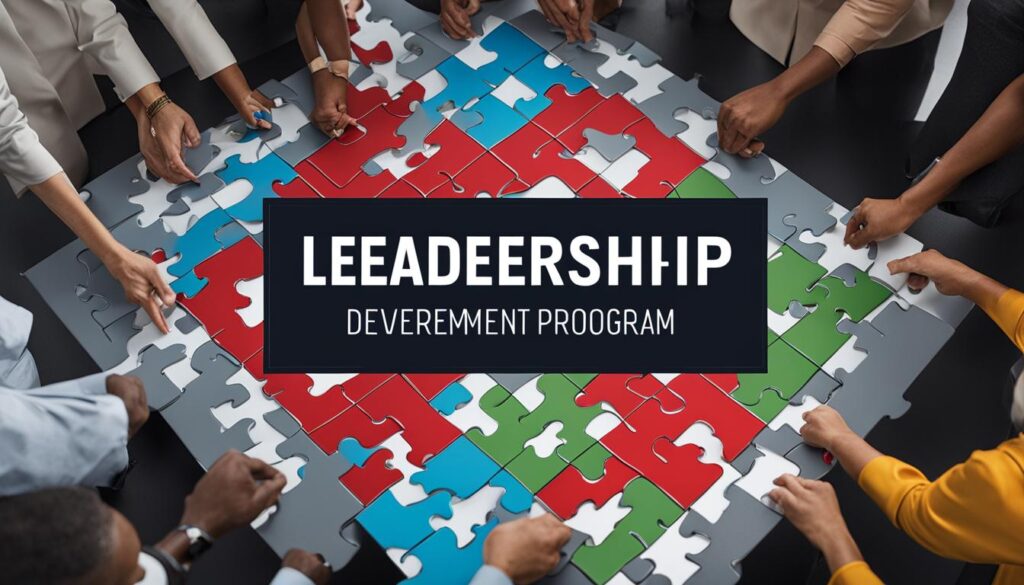Leadership is a multifaceted concept that requires a combination of qualities, principles, and strategies. Effective leadership is built upon a foundation of core principles, including vision, integrity, empathy, adaptability, communication, accountability, resilience, and empowerment. To develop leadership skills, individuals can focus on self-awareness, continuous learning, seeking feedback, mentorship and coaching, leadership development programs, and networking. Effective leadership is a continuous journey of growth and development.
Key Takeaways:
- Effective leadership is built upon core principles such as vision, integrity, and communication.
- Developing leadership skills requires self-awareness, continuous learning, and seeking feedback.
- Mentorship, coaching, and leadership development programs are valuable resources for aspiring leaders.
- Networking and building strong relationships can contribute to leadership growth.
- Leadership is a continuous journey of growth and development.
The Leadership Conundrum
Effective leadership is often described as the ability to influence, guide, and inspire others towards a common goal. However, it is not a one-size-fits-all concept. Leadership is complex, dynamic, and context-dependent. Understanding the foundational principles and qualities of effective leadership is crucial. These include vision, integrity, empathy, adaptability, communication, accountability, resilience, and empowerment. Building these qualities is essential for aspiring leaders.
Leadership qualities can be honed through various avenues, such as leadership training programs, workshops, and seminars. These platforms provide individuals with the knowledge, skills, and tools needed to develop their leadership capabilities. By participating in interactive sessions, engaging in role-playing exercises, and learning from experienced leaders, aspiring leaders can enhance their understanding of effective leadership and apply these principles in real-world scenarios.
One of the key benefits of leadership workshops and seminars is the opportunity to engage with like-minded individuals who are also on their leadership journey. Networking and collaborating with peers can provide valuable insights, broaden perspectives, and create a support system for ongoing growth and development. These interactions allow leaders to learn from each other’s experiences, share best practices, and establish relationships that can bolster their leadership skills.
Overall, the leadership conundrum highlights the complexity and multifaceted nature of effective leadership. It requires a combination of qualities, principles, and strategies that can be cultivated through leadership training, workshops, and seminars. By embracing continuous learning, self-reflection, and the guidance of experienced mentors, aspiring leaders can navigate the leadership conundrum and become impactful leaders in their respective fields.
The Eight Pillars of Effective Leadership
Effective leadership is built upon eight pillars that serve as the foundation for successful leadership. These pillars guide leaders in their decision-making and actions, shaping their ability to inspire and lead others towards a common goal. Let’s explore each of these pillars in detail:
- Vision: Leaders with a clear vision inspire and motivate their team members. They articulate a compelling future and set strategic goals to create a sense of direction and purpose.
- Integrity: Integrity is essential for building trust and respect. Leaders with integrity demonstrate honesty, ethical behavior, and consistency, acting as role models for their team.
- Empathy: Empathy fosters strong relationships and collaboration. Leaders who show empathy understand and connect with their team members on a deeper level, leading to increased engagement and productivity.
- Adaptability: In today’s fast-paced world, adaptability is crucial for leaders. They must be open to change, embrace new ideas, and navigate through uncertainty with agility.
- Communication: Effective communication is the cornerstone of successful leadership. Leaders who communicate clearly and actively listen to their team members foster a culture of trust, transparency, and collaboration.
- Accountability: Accountability means taking responsibility for one’s actions and decisions. Leaders who hold themselves and others accountable create a culture of ownership and high performance.
- Resilience: Resilience is the ability to bounce back from setbacks and navigate adversity. Leaders who demonstrate resilience inspire their team members and instill confidence in times of challenge.
- Empowerment: Empowerment allows individuals to grow, take ownership of their work, and contribute their best. Effective leaders empower their team members by providing autonomy, resources, and support.
These eight pillars form a strong framework for effective leadership, supporting leaders in their quest to inspire, motivate, and guide their teams towards success.
Strategies for Developing Effective Leadership
Developing effective leadership skills is a continuous process that requires dedication and intentional effort. By adopting the following strategies, individuals can enhance their leadership abilities and make a lasting impact in their roles:
- Invest in Leadership Coaching: Leadership coaching provides valuable guidance and support, helping individuals develop self-awareness, improve communication skills, and enhance their decision-making abilities. A skilled coach can provide personalized insights and strategies for growth.
- Participate in Leadership Development Programs: Leadership development programs offer a structured approach to developing leadership skills. These programs often include workshops, seminars, and practical exercises that focus on key areas such as communication, team management, and strategic thinking.
- Seek Continuous Learning: Leaders should have a mindset of continuous learning, seeking out opportunities to expand their knowledge and skills. This can involve reading books, attending conferences, or taking online courses to stay updated with the latest trends and best practices in leadership.
- Embrace Feedback: Feedback is a valuable tool for growth. Leaders should actively seek feedback from colleagues, team members, and mentors to gain different perspectives and identify areas for improvement. By being open to feedback and taking it constructively, leaders can refine their leadership style and enhance their effectiveness.
Quote:
“Leadership is not about being in charge. It is about taking care of those in your charge.” – Simon Sinek
Implementing these strategies can help individuals develop their leadership skills and achieve their full potential. Effective leadership is a journey that requires continuous self-reflection, learning, and growth. By investing in leadership coaching, participating in development programs, seeking continuous learning, and embracing feedback, individuals can become more confident, influential leaders who inspire and empower those around them.
The Paradox of Leadership
Effective leadership often involves navigating paradoxes, where leaders must strike a delicate balance between seemingly contradictory qualities and actions. These paradoxes challenge leaders to find the right equilibrium to drive success. Three essential leadership paradoxes worth exploring are confidence vs. humility, decisiveness vs. collaboration, and leading vs. serving.
Confidence vs. Humility
Leaders need confidence to inspire trust and guide their teams towards achieving goals. However, excessive confidence can lead to arrogance and the disregard for others’ perspectives. Effective leaders strike a balance between confidence and humility, where they display self-assurance while remaining open to feedback and receptive to differing viewpoints.
Decisiveness vs. Collaboration
Leaders are often expected to make quick decisions in fast-paced environments. While decisiveness is crucial, leaders must also foster a collaborative culture that values and incorporates diverse opinions. By involving team members in the decision-making process, leaders enhance buy-in, improve problem-solving, and create a sense of ownership within the team.
Leading vs. Serving
Leadership is not solely about taking charge and giving directives; it is also about serving the needs of the team. Effective leaders prioritize the growth, development, and well-being of their team members. By providing support, guidance, and resources, leaders empower their team to achieve their full potential and drive collective success.
The ability to navigate these paradoxes distinguishes exceptional leaders from the rest. Successfully striking the right balance between confidence and humility, decisiveness and collaboration, and leading and serving enables leaders to foster an inclusive, high-performing, and growth-oriented culture.

Real-Life Leadership Stories
Real-life leadership stories provide invaluable insights into the qualities and actions of effective leaders. By examining the experiences of successful leaders, we can gain inspiration and learn valuable lessons that can be applied to our own leadership journeys.
Angela, the CEO of a tech startup, exemplified transformational leadership. With a clear vision and strong sense of empowerment, she inspired her team to reach new heights. Angela understood the importance of fostering an environment where each team member could contribute their best work, and she provided the necessary resources and support to make that happen.
“As a leader, it is crucial to have a clear vision and communicate it effectively to your team. When everyone is aligned and working towards a common goal, incredible things can be achieved.”
James, a hospital administrator, demonstrated empathetic leadership. He understood the importance of listening to his team and supporting their well-being. Through his genuine concern and compassion, he created a culture of trust, collaboration, and growth.
“Empathy is a powerful tool in leadership. When you truly understand and value your team members’ perspectives, you can create an environment where everyone feels heard and supported. This fosters stronger relationships and promotes a positive work culture.”
These real-life leadership stories showcase the impact of effective leadership in various contexts. They highlight the importance of qualities such as vision, empowerment, empathy, and communication. By learning from these stories, we can gain valuable insights into what it takes to become a successful leader and inspire those around us.
The Continuous Journey of Leadership
Effective leadership is not a destination; it is a continuous journey of growth and development. Aspiring leaders can embark on this journey by actively participating in leadership development programs, attending workshops and seminars, and honing their skills through coaching and mentorship. These opportunities provide valuable learning experiences and equip individuals with the tools they need to become effective leaders.
Leadership development programs offer a structured approach to developing leadership skills. They provide a comprehensive curriculum that covers various aspects of leadership, including communication, decision-making, team building, and strategic thinking. Through these programs, individuals can gain a deeper understanding of their strengths and areas for improvement, learn practical leadership techniques, and enhance their ability to lead others effectively.
Workshops and seminars provide an interactive and engaging learning environment where aspiring leaders can acquire new knowledge, exchange ideas, and network with like-minded individuals. These events often feature renowned speakers and industry experts who share their insights and experiences, offering valuable insights and practical tips for leadership success.
Coaching and mentoring play a crucial role in developing effective leaders. Working with a coach or mentor provides personalized guidance, support, and feedback, helping individuals identify and overcome challenges, develop their leadership style, and navigate their career paths. These one-on-one relationships can be transformative, providing a safe space for leaders to explore their potential and grow into their roles.

Cultivating Leadership Skills
- Focus on self-awareness: Understanding one’s strengths, weaknesses, and values is essential for effective leadership.
- Continuous learning: Stay curious, seek new knowledge, and embrace lifelong learning to stay ahead in a rapidly changing world.
- Seek feedback: Actively seek feedback from peers, superiors, and team members to gain insights and identify areas for improvement.
- Embrace the paradoxes of leadership: Balance confidence with humility, decisiveness with collaboration, and leading with serving.
- Stay resilient: Develop the ability to bounce back from setbacks, adapt to change, and navigate challenges with grace.
- Communicate effectively: Master the art of clear and concise communication, both verbal and nonverbal.
- Lead by example: Inspire others through your actions, demonstrating the qualities and behaviors you expect from your team.
- Empower others: Create an environment that fosters autonomy and encourages individuals to take ownership of their work.
Leadership is not a destination but a continuous journey of growth and development. By actively investing in their development, aspiring leaders can cultivate the necessary skills and qualities to make a lasting impact in their organizations and communities.
The Art of Clarity and Direction
Leadership is not just about providing direction and clear instructions to your team; it’s also about demonstrating through action. The “Tell Them” phase of leadership involves communicating expectations and goals clearly, but it’s important to strike a balance and avoid creating a culture of dependency. By relying solely on instruction, leaders risk stifling creativity and hindering independent thinking.
To foster independence and innovation, leaders must also embrace the “Show Them” phase of leadership, leading by example and demonstrating the behaviors and qualities they expect from their team. This phase bridges the gap between telling and empowering, inspiring others through demonstration and showcasing the desired qualities and actions.
“Actions speak louder than words.”
Effective leaders understand that clarity and direction are essential, but it is equally important to empower their team members to think for themselves and make decisions. By demonstrating the desired behaviors and qualities, leaders set the stage for a culture of independent thinking, innovation, and proactivity.
Cultivating Autonomy and Mastery
As leadership progresses, leaders move into the “Lead Them” phase, where their focus shifts to being facilitators for their team members. This phase involves coaching, supporting, and inspiring individuals to take ownership of their work and contribute their best efforts.
Cultivating autonomy and mastery within the team is a key aspect of effective leadership. By empowering team members to make decisions and take ownership of their work, leaders foster a sense of autonomy and accountability. This autonomy allows individuals to excel in their roles and contribute to the overall success of the team and organization.
Leaders also play a crucial role in supporting team members in their journey towards mastery. By providing guidance, resources, and opportunities for growth and development, leaders create an environment where individuals can continuously improve their skills and capabilities.
The Cultivation of Autonomy and Mastery in Leadership
As leaders progress in their journey, they reach a phase known as “Lead Them”. This phase represents the pinnacle of leadership, where leaders transition from being directive to becoming facilitators of growth and development. During this phase, leaders focus on cultivating autonomy and mastery within their team members, allowing them to take ownership of their work and contribute their best efforts.
Creating a culture of autonomy involves empowering team members to make decisions and take responsibility for their actions. Leaders provide guidance and support, allowing individuals to learn from their experiences and grow as professionals. By giving team members the freedom to exercise their skills and talents, leaders foster a sense of ownership and commitment.
“The best way to engender loyalty and long-term commitment is to create an environment where individuals feel empowered to take ownership of their work and contribute their best efforts.” – Leadership Expert
Mastery, on the other hand, refers to the continuous development of skills and expertise. Leaders encourage continuous learning and provide opportunities for growth through leadership development programs, workshops, and seminars. By investing in their team members’ professional development, leaders foster a culture of excellence and innovation.
Fostering Autonomy and Mastery:
- Encourage team members to make decisions and take ownership of their work.
- Provide guidance and support, allowing individuals to learn from their experiences.
- Offer opportunities for continuous learning through leadership development programs, workshops, and seminars.
- Invest in the professional development of team members, helping them cultivate their skills and expertise.

By cultivating autonomy and mastery within their team, leaders create an environment that fosters personal and professional growth. Team members become more engaged, proactive, and motivated to excel in their work. This ultimately leads to the creation of high-performing teams that consistently deliver exceptional results.
A Team That Thrives
Effective leadership goes beyond simply giving instructions and managing tasks. It involves creating a team that not only performs well but also feels empowered, innovative, and proactive. By moving beyond the traditional “tell them” approach and engaging with their team members, leaders can foster a culture of excellence and create an environment where everyone can thrive.
Leadership development programs play a crucial role in empowering leaders to build thriving teams. These programs provide valuable training and education on essential leadership skills, such as communication, collaboration, and empowerment. Through leadership coaching and skills training, aspiring leaders can develop the necessary tools to inspire and motivate their team members.
“A team that thrives is one that is not only effective in their work but also proactive and passionate about what they do,” says Jane Smith, a leadership coach with 10 years of experience. “Effective leaders create an environment where team members are encouraged to take initiative, explore new ideas, and drive results. It’s about fostering a sense of ownership and empowerment.”

Leadership development programs, combined with ongoing coaching and mentorship, provide leaders with the necessary tools to create a team that thrives. By investing in leadership skills training and development, organizations can cultivate a culture of excellence and drive growth and success.
Promising Leadership Qualities
When it comes to identifying future leaders, certain qualities set individuals apart and contribute to their ability to drive growth and inspire teams. Organizations looking to develop effective leaders should focus on nurturing and developing these qualities within their leadership development programs, such as leadership skills training, workshops, and seminars.
A visionary outlook is a crucial characteristic of promising leaders. They have the ability to see the bigger picture and articulate a compelling vision for the future. Alongside this, strong emotional intelligence allows leaders to connect with others on a deeper level, fostering trust and collaboration.
A continuous learning mindset is essential for leaders to stay adaptable and open to new ideas. They actively seek opportunities for growth and professional development, recognizing that leadership skills are not static but require constant honing.
Resilience and adaptability are vital qualities for leaders to navigate challenges and change. Effective communication skills enable leaders to convey their vision, expectations, and feedback clearly, minimizing misunderstandings and fostering a positive work environment.
Decisiveness and accountability are critical for leaders to make informed decisions and take ownership of their actions. Collaboration is another key quality, as leaders who value input from their team foster an environment of inclusivity and innovation.
Moreover, integrity and ethics are foundational to effective leadership. Leaders who prioritize integrity build trust and credibility among their team members and stakeholders. Lastly, empowerment and mentoring are essential for leaders to cultivate the potential in others, creating a culture of growth and development.
By recognizing and nurturing these promising qualities, organizations can foster a pipeline of future leaders who will drive success and create a positive impact within their teams and beyond.
FAQ
What qualities are important for effective leadership?
The important qualities for effective leadership include vision, integrity, empathy, adaptability, communication, accountability, resilience, and empowerment.
How can I develop my leadership skills?
You can develop your leadership skills by focusing on self-awareness, continuous learning, seeking feedback, mentorship and coaching, leadership development programs, and networking.
What are the pillars of effective leadership?
The pillars of effective leadership are vision, integrity, empathy, adaptability, communication, accountability, resilience, and empowerment.
What strategies can I use to develop effective leadership?
You can develop effective leadership by implementing strategies such as self-awareness, continuous learning, seeking feedback, mentorship and coaching, leadership development programs, and networking.
What are some paradoxes of leadership?
Some paradoxes of leadership include finding the balance between confidence and humility, decisiveness and collaboration, and leading and serving.
Can you provide any real-life examples of effective leadership?
Yes, for example, Angela, a CEO of a tech startup, exhibited effective leadership through clear vision and empowerment. James, a hospital administrator, showed empathetic leadership by listening to his team and supporting their well-being.
Is leadership a continuous journey?
Yes, effective leadership is a continuous journey of growth and development.
How can leaders provide clarity and direction?
Leaders can provide clarity and direction by effectively communicating clear directions and expectations to their team members.
How can leaders cultivate autonomy and mastery?
Leaders can cultivate autonomy and mastery by focusing on coaching, supporting, and inspiring their team members, enabling them to take ownership and contribute their best work.
What are the benefits of effective leadership for a team?
Effective leadership leads to empowered, innovative, and proactive teams that excel in their work and drive results.
What qualities are important for promising leaders?
Promising leaders possess qualities such as a visionary outlook, strong emotional intelligence, a continuous learning mindset, resilience and adaptability, effective communication skills, decisiveness and accountability, collaboration, integrity and ethics, and empowerment and mentoring.
Source Links
- https://lorna-ws.medium.com/unveiling-the-secrets-qualities-of-promising-leadership-candidates-77a94a12f157
- https://medium.com/@proprag/unveiling-the-secrets-to-effective-leadership-a-journey-from-instruction-to-empowerment-fb9363dc93b0
- https://www.linkedin.com/pulse/unveiling-secrets-effective-leadership-endeavour-marketing-llp
